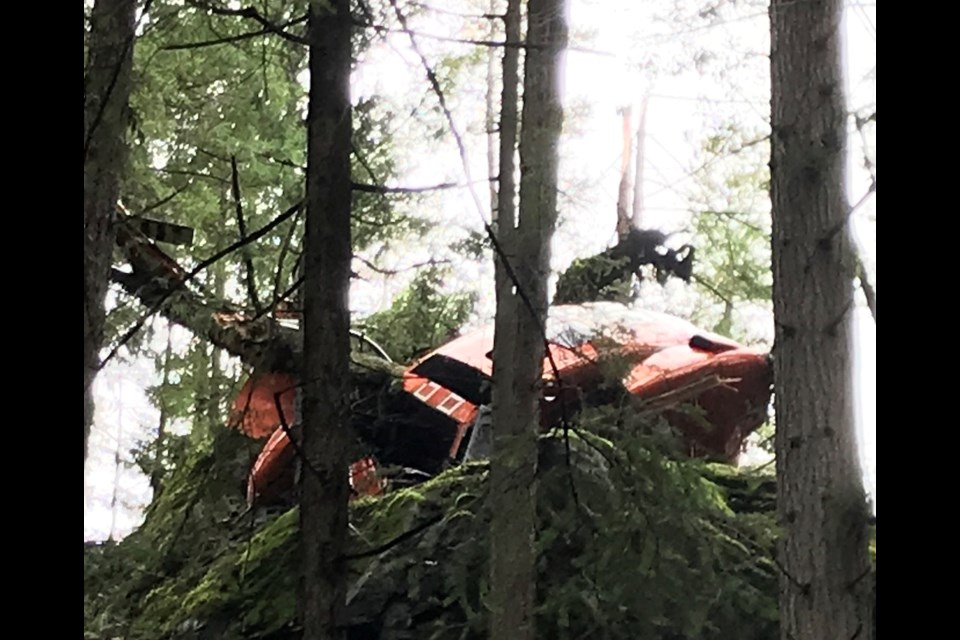A 2021 helicopter crash on Bowen Island that left one Bell 212 totalled but that two local pilots miraculously survived, was caused by “environmental conditions” and helicopter “system limitations,” a Transportation Safety Board of Canada (TSB)
The Sechelt-based aircraft was headed out to Cypress Provincial Park that day – March 5, 2021 – where it was doing work for СŔ¶ĘÓƵ Hydro. There were no passengers on-board and the helicopter wasn’t carrying any load.
The weather was “conducive to severe mechanical turbulence, lee waves and low-level wind shear along the helicopter’s flight path,” said the July 28, 2022, TSB release. The pilots were aware of the conditions but based on an improving forecast, desire to complete the flight and observation that other aircraft were operating out of the Sechelt airport, decided to continue, said the TSB.
The flight lifted off from Sechelt Airport at about 9:35 a.m. Ten minutes later, cruising about two nautical miles away from Bowen, the helicopter entered a section of severe turbulence, which led to a loss of control and “excessive flapping of the main rotor blades,” said the release. The main rotor blades severed the tail rotor driveshaft, so there was loss of “rotor thrust and yaw control.”
The pilots regained control but the Bell 212’s extreme attitude (it was inverted or nearly inverted, the report says) during that first loss of control likely caused the malfunction of the hydraulic system and caused an engine to shut down, explains the release. The flight controls became hard to manipulate and the pilots chose a large field on nearby Bowen Island for an emergency landing.
When the helicopter slowed for landing, the absence of tail rotor thrust (because the drive shaft had been severed, which the pilots didn’t know) resulted in losing yaw control and the helicopter began a rapid spin to the right. After several rotations, the helicopter hit trees and came to a rest upside down on a rocky ridge in the Mount Gardner area (northwest corner) of Bowen, according to the report. Photos of the incident showed the fuselage rested against a large tree on the cliffside.
While both pilots were injured, they walked away from the crash. The investigation found that the pilots’ flight helmets and four-point safety belts reduced the severity of their injuries and they were able to exit the helicopter quickly.
At the time of the crash, there was unanimity among first responders that the pilots were two of the luckiest guys going – the Bowen Island Fire Department thought they would be attending a much grimmer scene. “But the two, they were just sitting there. And there were a few little cuts on their hands and that’s about it,” the island’s deputy fire chief told the Bowen Island Undercurrent at the time.
Paul Tosczak, owner and operator of Airspan Helicopters, was one of the two pilots in the helicopter. While the experience was awful, he's now also thankful for the gift of perspective he’s gained. “It was a terrible thing. I wish it never happened,” Tosczak said in an interview on July 28, after the report was released. “[But] it's made me a better person, a better owner-operator, a better pilot and more of an experienced or well-rounded person.
“Talk with older guys in the aviation community, it's like 'Paul, you got a lifetime experience in three minutes.'”
Airspan temporarily suspended operations following the incident and did an internal safety investigation, said the TSB release, and took actions to mitigate future incidents.
The biggest change is that company won’t fly in forecasted severe turbulence or inclement weather anymore, said Tosczak.



